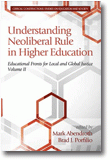
Understanding Neoliberal Rule in Higher Education
Educational Fronts for Local and Global Justice
Edited by:
Mark Abendroth, SUNY Empire State College
Brad J. Porfilio, Seattle University
A volume in the series: Critical Constructions: Studies on Education and Society. Editor(s): Brad J. Porfilio, California State University, Stanislaus. Marc Pruyn, Monash University. Derek R. Ford, DePauw University.
Published 2015
The word fundamentalism usually conjures up images of religions and their most zealous followers. Much less often the word appears in connection with political economy. The phrase “free market” gives the connotation that capitalism is freedom. Neoliberalism is the rise of global free-market fundamentalism. It reaches into nearly every aspect of our daily lives as it seeks to dominate and eliminate the last vestiges of public domains through wanton privatization and deregulation. It degrades all that is public. The good news is that a global community of resistance continues to struggle against neoliberal oppression. Formal and informal education entities contribute to these struggles, offering visions and strategies for creating a better future.
The purpose of this volume is twofold. Several contributors will highlight how the neoliberal agenda is impacting educational policy formation, teaching and learning, and relationships between institutions of higher education and communities. Other contributors will highlight how the global community has gradually become conscious of the ideological doctrine and how it is responsible for human suffering and misery.
The volume is needed because the growing body of educational research linked to exploring the impact of neoliberalism on education and society fails to provide conceptual or historical understanding of this ideology. It is also an important scholarly intervention because it provides insights as to why educators, scholars, and other global citizens have challenged the intrusion of market forces over life inside universities and colleges.
Teaching faculty, research faculty, and anyone who yearns to understand what is behind the debilitating trend of commercial forces subverting humanizing educational projects would benefit from this volume. Activists, educators, youth, and scholars who seek strategies and visions for building democratic higher education and a more democratic society would consider this volume essential reading.
CONTENTS
Introduction, Mark Abendroth and Brad J. Porfilio. Section I: Demystifying Neoliberalisms’s Effects on Higher Education. The Consumed University: Neoliberalism in Academia, Antonio Redfern Pucci. A Culture of Cheating at the University? Warren J. Blumenfeld. Under the Shadow of the Neoliberal University: The Challenge of Matching Enthusiasm for Internationalization Programs With Commitment to Student Diversity on College Campuses, Ramin Farahmandpur, Michael J. Smith, and Akiko Ota. Section II: General Education Issues in Neoliberal Times. The Politics of Access in the Neo-Liberal Age, Richard Wells and Dianne Ramdeholl. Visible Scars, Hidden Costs: Reaping What the Neoliberal Agenda Sows in Our Local Communities, Mark Davies. Money, Markets, and Capitalism: How Neoliberalism Leads to Exclusion, Economic Inequality, Instability, and Illness, Nicholas D. Hartlep. Section III: Teacher Education in Neoliberal Times. Teacher Preparation for Public Education, Lanney Mayer. Neoliberal Assessments and the Rise of the Educator Preparation Program Enterprise, Lisa Zagumny, Julie Baker, and Tessa Bishop. Education Against the Neoliberal Social Imaginary: Toward a Pedagogy of Democratization, Patrick M. Jenlink. Deterritorializing Neoliberal Thought and Practice in the Classroom, Kathryn J. Strom and Adrian D. Martin. Academic Disobedience: Engaging Michael Apple’s Nine Tasks of the Critical Scholar in an Age of Standardization, Arlo Kempf and Ruth Powers Silverberg. Section IV: Higher Education in Higher Resistance. The Pervasive Influence of Neoliberal Ideology on U.S. Community Colleges and a Freirean View on “Reclaiming the American Dream”, Ana L. Cruz and Joachim Dorsch. Feral Literature: Anti-Capitalism’s Final Frontier? Virginia Konchan. Neoliberalism, Immiseration Capitalism, and the Historical Urgency of a Socialist Education, Curry Malott, Dave Hill, and Grant Banfield. Recognize, Resist, and Reconstitute: An EcoJustice Response to Neoliberalism, John Lupinacci and Alison Happel. Education for Democracy and the Specter of Neoliberalism Jamming the Classroom, Paul R. Carr and Gary W. J. Pluim. About the Editors. About the Contributors.
-
Paperback978-1-68123-125-9
Web price: $45.04 (Reg. 52.99)
-
Hardcover978-1-68123-126-6
Web price: $80.74 (Reg. 94.99)
- eBook978-1-68123-127-3

- EDU000000 - EDUCATION: General
- EDU015000 - EDUCATION: Higher
- EDU009000 - EDUCATION: Educational Psychology
-
 DIY Punk as Education
From Mis‐education to Educative Healing
DIY Punk as Education
From Mis‐education to Educative Healing
-
 Imagining Education
Beyond the Logic Of Global Neoliberal Capitalism
Imagining Education
Beyond the Logic Of Global Neoliberal Capitalism
-
 Multiculturalism, Dialectical Thought, and Social Justice Pedagogy
A Study from the Borderlands
Multiculturalism, Dialectical Thought, and Social Justice Pedagogy
A Study from the Borderlands
-
 Read Aloud Handbook for Native American Children
Read Aloud Handbook for Native American Children
-
 Rethinking Social Studies
Critical Pedagogy in Pursuit of Dangerous Citizenship
Rethinking Social Studies
Critical Pedagogy in Pursuit of Dangerous Citizenship
-
 The 2017 Hampton Reader
Selected Essays from a Working-class Think Tank
The 2017 Hampton Reader
Selected Essays from a Working-class Think Tank
-
 The Luso-Anarchist Reader
The Origins of Anarchism in Portugal and Brazil
The Luso-Anarchist Reader
The Origins of Anarchism in Portugal and Brazil

